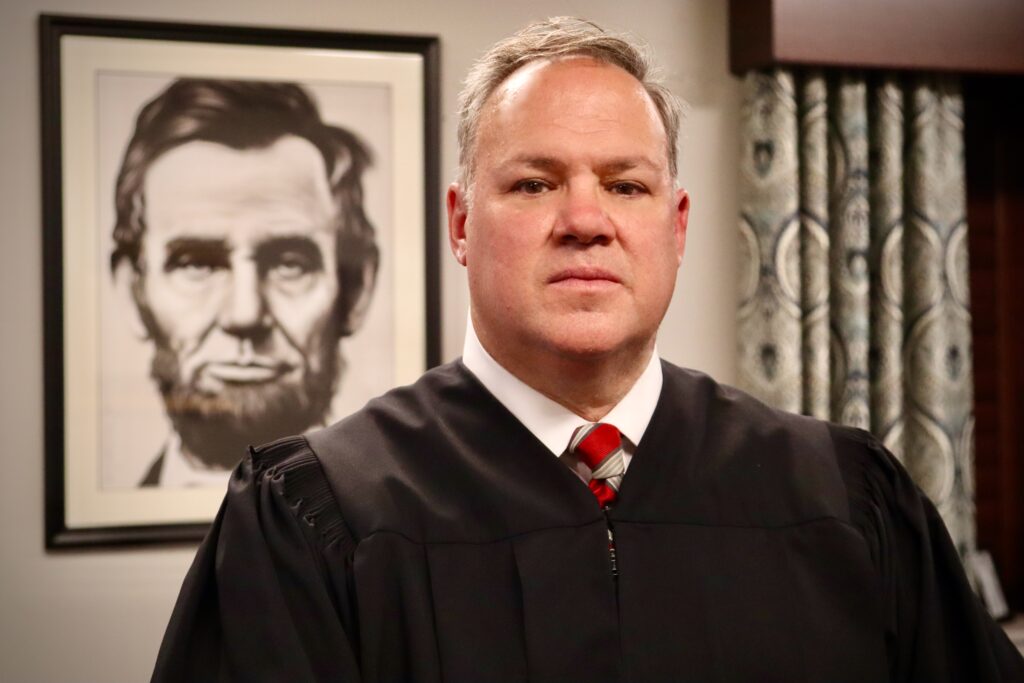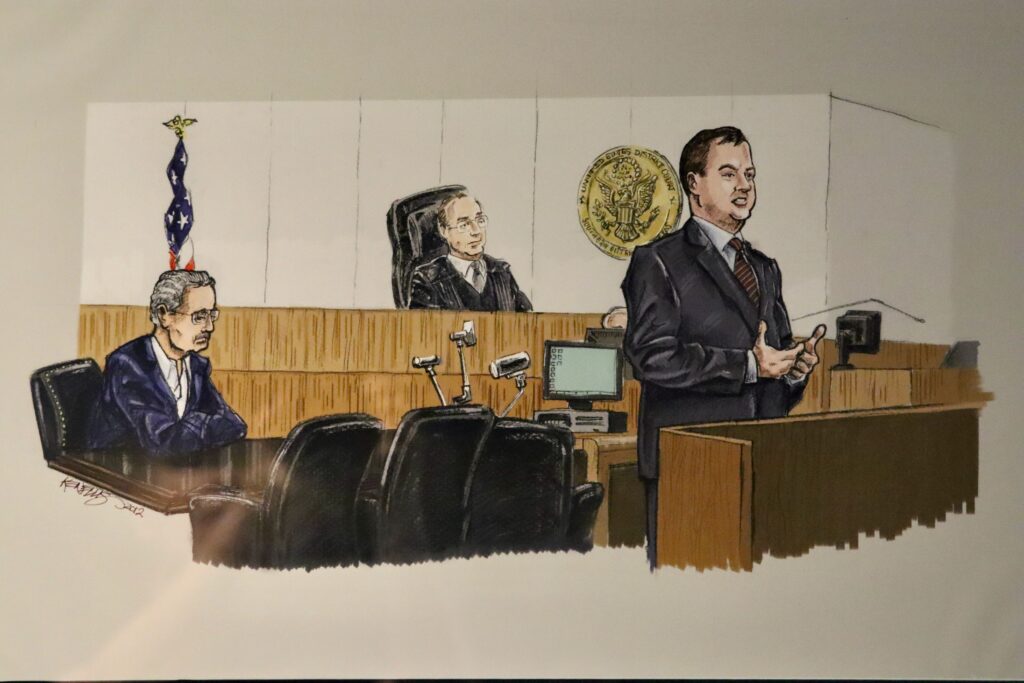Federal appellate judges almost never resign; and they never ever go back to practicing law.
Judge Gregg Costa, the Houston federal prosecutor who sent billionaire financial fraudster Allen Stanford to prison in 2012 and then was appointed to the U.S. Court of Appeals for the Fifth Circuit by President Obama, is doing both.

Costa is giving up his black robe and the lifetime job security of a federal judgeship to join the Houston office of Gibson, Dunn & Crutcher to co-lead the global law firm’s litigation and trial practice.
Lawyers and judges said they were shocked and saddened to learn that he was leaving the federal bench.
At age 50, Costa was often considered a possible candidate for the U.S. Supreme Court because he boasts both conservative and liberal credentials. He clerked for conservative former U.S. Chief Justice William Rehnquist, was appointed to the federal bench in 2014 by President Barack Obama and had the support of both Texas Republican senators. The U.S. Senate confirmed Costa’s nomination 97-0.
“Gregg is a gifted constitutional scholar and an incredibly gifted writer,” said Chief Judge Lee Rosenthal of the Southern District of Texas. “He is truly beloved by district court judges because of his ability and willingness to defend the district judges even when others were dismissive of the role of district judges. He is going to be missed.”
In an exclusive Texas Lawbook interview, Costa said the time was right and that Gibson Dunn is the perfect fit. He will start at the law firm in October.
“I would rather be in the batter’s box swinging at pitches than be the umpire,” said Costa, a lifelong baseball fan. “I want a new challenge. I want to build a law practice. And there is an increase in pay.”
Costa is moving his Houston office seven blocks. His new Gibson Dunn office at 811 Main St. is about one-tenth the size of his 3,000-square-foot suite at the federal courthouse, but he is getting a compensation boost – from $229,500 as a federal appellate judge to an estimated more than $3 million annually.
But money is definitely not the motivating factor, as Costa’s wife, Jennifer Paine Costa, is also a lawyer and in-house counsel at Calpine Energy Solutions.
“The decision was definitely hard for Gregg because he’s giving up protégé and once you quit [a federal judgeship], you can’t get it back,” she said. “I am sad because he is such a great judge. He is incredibly brilliant. But don’t ask him what kind of detergent to put in the dishwasher because he puts in the liquid detergent and our kitchen floor gets flooded.”
Costa said he discussed positions with several law firms.
“The depth of Gibson Dunn’s litigation practice in Texas and nationally impressed me a lot,” he said. “I want to do civil trial work and white-collar defense work. I want to be part of a team that is young and growing in Houston but that also has a deep bench.”
A Los Angeles-founded law firm, Gibson Dunn has more than 1,600 lawyers in 20 offices worldwide. In 2021, the firm’s lawyers generated $2.48 billion in revenue and reported profits per partner of $4.4 million.
In Texas, Gibson Dunn has witnessed a huge growth spurt the past three years. The firm had 57 lawyers in Texas in 2016 and generated $78 million from its Texas operations, according to the Texas Lawbook 50, which tracks revenues of law firms operating in Texas.
In 2021, the number of attorneys Gibson Dunn in Texas swelled to 125 and revenues hit $188.7 million. Nearly half of those 125 lawyers practice litigation.
“Gregg’s a winner, and he has a unique perspective,” said Collin Cox, a Gibson Dunn litigation partner in Houston. “He’s prosecuted cases, he’s defended cases, and he’s decided cases as a judge. With that background and his brilliant legal mind, he’ll be a formidable litigation strategist.”
Cox said the firm is committed to growing its Dallas and Houston offices even more.
“I think it’s a natural response to all the economic drivers that are propelling our state’s economy – in energy, technology, health care, and many other industries,” he said. “All the Fortune 1000 companies moving to Texas need lawyers to represent them. And our courts are known to be efficient and fair, so we have a lot of litigation.”
Gibson Dunn might also have gotten an internal boost from within the Fifth Circuit. Judge James Ho co-led the firm’s appellate litigation practice when President Trump appointed him in 2018 to became one of Costa’s colleagues at the Fifth Circuit.
“Gregg is a prodigious legal talent and a distinguished public servant,” said Judge Ho. “Any law firm would be extraordinarily fortunate to have him.”
In his eight years on the Fifth Circuit, which handles appeals from federal trial courts in Texas, Louisiana and Mississippi, Costa wrote more than 300 majority opinions on issues ranging from business antitrust allegations, commercial contract and insurance disputes, employment discrimination and violations of the Voting Rights Act.
Just last week, Costa wrote a precedent-setting decision in a case between Florida power giant NextEra Energy Capital and the Texas Public Utility Commission. Costa, writing for a three-judge panel of the Fifth Circuit, ruled that a 2019 Texas law that prohibited out-of-state electric power providers from constructing new power transmission lines in Texas if those companies do not already have operations in the state violates the dormant Commerce Clause of the U.S. Constitution.
Costa called the Texas law the most protectionist in the U.S.
But Costa, a moderate who sought to bring judges from both political persuasions together, increasingly found himself writing dissenting opinions as part of a near-perpetual minority, as six conservative judges appointed by President Trump joined the Fifth Circuit between 2017 and 2020.
“Since I arrived, no question that the court has changed,” Costa told The Texas Lawbook in an exclusive interview. “Writing dissents for the next couple decades is not something I look forward to doing. Knowing that I would be in the dissent on so many important issues would not be fun.”
“You cannot help but notice on the most politicized cases that the decisions are made along political appointment lines,” he said.
Born in Baltimore, Costa was 18 months old when his parents moved to the Dallas area for work. His father investigated disability claims, and his mother worked in retail.
“During the summers, we played baseball in the morning, traded baseball cards in the afternoon and played more in the evening,” he said. “It was baseball 24/7.”
In college, Costa read Den of Thieves, a Pulitzer-Prize winning book by New York Times columnist James Stewart about four Wall Street traders who perpetrated an insider-trading scheme that rocked the stock markets.
“I had an instant reaction to the book,” he said. “I knew that’s what I wanted to do – to prosecute cases against people like Michael Milken and Ivan Boesky.”
After graduating from the University of Texas School of Law, Costa clerked for U.S. Chief Justice William Rehnquist, who Costa describes as “a wonderful boss and a once-in-a-lifetime experience.”
“Chief Justice Rehnquist bet on everything – football, the Kentucky Derby, even the snowfall in the weather forecast,” Costa said. “We would go outside the Supreme Court and have a ceremonial measurement to see how much snow fell and who won.”
Costa said a key reason that Chief Justice Rehnquist hired him as a clerk was because Costa planned to return to Texas to practice law.
As promised, Costa returned to Texas to work three years at Weil, Gotshal & Manges in Houston, where he was mentored by appellate giant Greg Coleman.
In 2005, he joined the U.S. attorney’s office as a federal prosecutor – a position he held for seven years.
Tim Johnson, who was the acting U.S. attorney for the Southern District of Texas and is now a partner at Locke Lord in Houston, asked Costa if he wanted to be a prosecutor in a new and developing case against Houston financier Allen Stanford.

Costa (standing) addresses the jury in the trial of Allen Stanford (seated, left).
Costa agreed and found himself leading the most case of his career.
“The Stanford prosecution is the single biggest accomplishment of my professional life,” he said. “The easy part of the case was the trial, because we had so much evidence against Stanford.”
“The management part of the case – juggling all the parties, collecting evidence on five different continents – was the hard part,” he said. “The international aspect was unprecedented.”
Costa even points back to the two years in Sunflower and his reading of Den of Thieves for his dogged success in the prosecution of Stanford.
“Most people’s perception is that the justice system is skewed in favor of the rich and powerful, and they are right,” he said. “Stanford was one of the richest people in the world, and we showed that the justice system held him accountable.”
With Costa leading the prosecution’s trial team, a Houston jury in March 2012 found Stanford guilty of 13 counts of fraud, conspiracy to commit money laundering and obstructing investigators.
Months later, Costa was sworn in as a federal district judge to serve in Galveston. He was only 39 and one of the youngest federal judges in the U.S.
“I loved being a trial judge and being in Galveston,” he said. “I knew I just had to be better than the last guy.”
The previous federal judge in Galveston was Judge Sam Kent, who resigned in 2009 amid congressional impeachment efforts and a federal criminal investigation on charges of sexual abuse. He pleaded guilty to obstruction of justice charges and was sentenced to 33 months in prison.
“Gregg restored dignity and reliability and trust in the federal bench in Galveston,” Chief Judge Rosenthal said. “He was a terrific district judge.”
Two years later, President Obama nominated Costa to the Fifth Circuit.
The decision to leave the Fifth Circuit was not easy, Costa said, but he points back to a decision he made in 1994 to delay going to law school in order to teach third and fourth grade public school students in Sunflower, Mississippi, an impoverished town of 1,100 about 105 miles north of Jackson. More than 95 percent of the students were Black, and nearly all lived at or below the poverty line.
“The discipline of having a job and being responsible for these kids was extraordinary,” said Costa, who was one of two white teachers at the rural school. “People think there are tough personalities on the Fifth Circuit. The judges here are a piece of cake compared to the students in my classes.”
One weekend, Costa invited a handful of students – all African American – to play baseball near his apartment. As they tossed the baseball around, a car drove up. The driver rolled down his window.
“There’s a reason why I send my kids to a private school – it is so they don’t have to see these [racial slur],” the white man yelled out. “I don’t want to see these kids back on my side of town ever again.”
Five of Costa’s 16 students made the honor role. Several went to college. Two did internships at the U.S. Supreme Court. One of his students is now the mayor of Sunflower.
“Being a teacher is the best training for lawyers,” Costa said. “Most people think that great lawyers have great arguing skills, but the real skill for lawyers is teaching. Rusty Hardin, a great trial lawyer, taught school in Alabama. Rusty knows how to teach juries and judges, and that’s why he has been so successful.”
“Those two years were time outside of the elite legal bubble, and I learned so much from those two years,” he said. “The experiences I had in Sunflower and the lessons I learned from my students there have helped shape so many of my decisions, including this one.”
